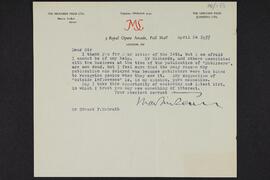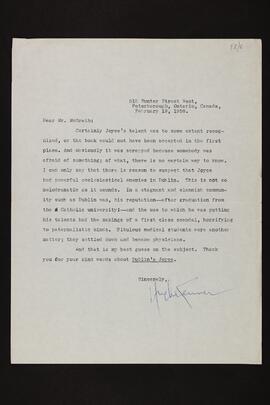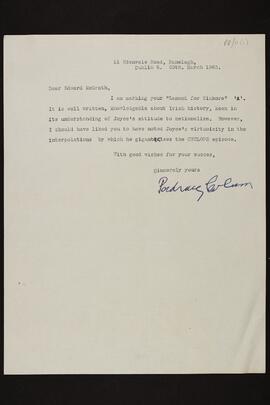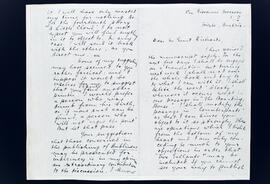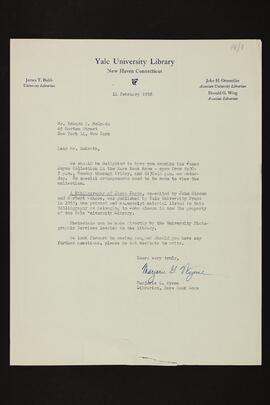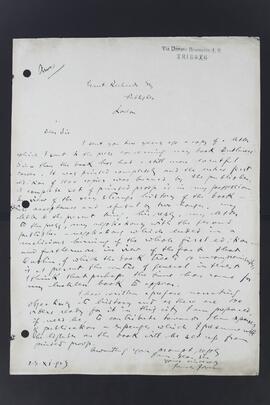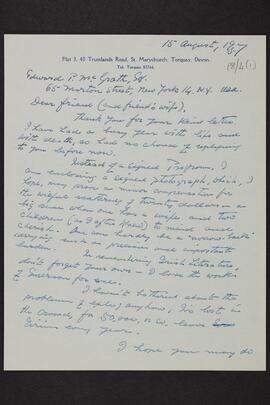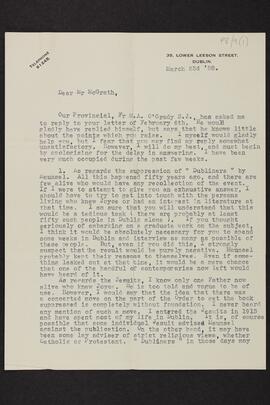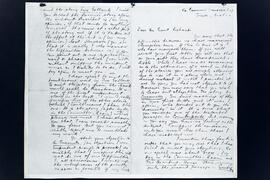Letter from Martin Secker, director of The Richards Press Ltd., 5 Royal Opera Arcade, Pall Mall, London. Informs McGrath that he cannot be of any help as Mr. Grant Richards (founder of Richards Press) and others associated with the business at the time of the publication of Joyce’s Dubliners were now dead. Also notes that the reason why publication was delayed was because ‘publishers were too blind to recognize genius when they saw it’ and that any suggestion of outside influences was ‘purely moonshine’. Included with this letter by McGrath is a brief history of Richards Press Ltd. and a newspaper cutting advertising a Sotheby’s auction at which inter alia the page proofs of Joyce’s Dubliners were to be sold.
Sin títuloLetter from Hugh Kenner, writer, critic and author of inter alia 'Dublin’s Joyce', 512 Hunter Street West, Peterborough, Ontario, Canada. In reply to a question posed by McGrath, Kenner suggest that Joyce’s talent was to some extent recognised or Dubliners would not have been accepted by the publishers in the first instance. States that he suspects that Joyce had ‘powerful ecclesiastical enemies in Dublin’ and that this may have had some bearing on why the there was a delay in the publication of Dubliners.
Sin títuloFrom Padraic Colum, poet and writer, 11 Edenvale Road, Ranelagh, Dublin 6, in which he praises McGrath’s Lament for Kincora, an article about Joyce. States that it is well written, knowledgeable about Irish history, and keen in the understanding of Joyce’s attitude to nationalism. Notes, however, that he should have ‘liked you to have noted Joyce’s virtuosity in the interpolations by which he giganticises the CYCLOPS episode’.
Sin títuloPhotocopy of a letter from James Joyce, Via Giovanni Boccaccio, Trieste, Austria to Grant Richards, in which he agrees to modify certain words and passages in Counterparts and other stories in order that the story Two Gallants may be included. Suggests to Richards that he find another printer ‘who was dumb from his birth, or, if none such can be found, a person who will not “argue the point”’. Concludes by saying that he has sent Richards a copy of a Dublin paper which will illustrate that ‘the Irish are the most spiritual race on the face of the earth’ and hopes that this will reconcile him to Dubliners. States that he seriously believes that Richards ‘will retard the course of civilisation in Ireland by preventing the Irish people from having one good look at themselves in my nicely polished looking-glass’.
Sin títuloLetter from Marjorie G. Wynne, Librarian, Rare Book Room, Yale University Library, New Haven, Connecticut. Informs McGrath that he can view the Joyce Collection in the Library without special appointment. Also notes that Joyce material previously in the ownership of John Slocum is now the property of Yale University Library.
Sin títuloPhotocopy of a letter from James Joyce, Via Donato Bramante, Trieste, Austria to Grant Richards, in which he outlines the publishing history of Dubliners. Mentions a letter which he had sent to the press in August 1911 concerning the book [copy included]. Suggests that in view of the strange publishing history of the book, and the fact that ‘Dublin is the centre of general interest’, the time is opportune for his ‘luckless book to appear’. States that he is willing to contribute to the expenses of publication if Richards is prepared to publish.
Sin títuloLetter from Seán O’Casey, Irish writer, Flat 3, 40 Trumlands Road, St. Marychurch, Torquay, Devon, in which he encloses a large signed black and white photograph of himself instead of a signed program, which McGrath requested. Asks McGrath that when remembering Irish literature, not to forget American writers such as Emerson whose work O’Casey admires. Also states that he is not ‘bothered’ about being an exile and that he is ‘lost in the crowd, for 50,000 [Irish people], or so, leave Éireann every year’.
Sin títuloLetter from Feargal McGrath, The Society of Jesus, 35 Lower Leeson Street, Dublin. Replying on behalf of Father M. A. O’Grady, The Society of Jesus, he informs Edward McGrath that it would be important to spend a few weeks in Dublin in order to interview people who knew Joyce. States that ‘the idea that there was a concerted move on the part of the Order (Jesuit) to get the book [Dubliners] suppressed is completely without foundation’. In reply to a question concerning the opinion of Irish Jesuits of Joyce, he notes that ‘some Jesuits think Joyce of great significance, in view of his undoubted influence on modern writing. Others think him greatly over-rated, and believe that the vogue for him will pass.’
Sin títuloThis sub-series contains McGrath’s collection of photocopies of James Joyce’s letters to his publisher Grant Richards.
Sin títuloPhotocopy of a letter from James Joyce, Via Giovanni Boccaccio, Trieste, Austria to Grant Richards, in which he outlines the various concessions he has made as to the alteration of some stories in Dubliners. States that he would rather omit five stories from the book than omit the story Two Gallants which is ‘the most important story in the book’. Also states that he regrets not being able to meet Richards in person and that if it were possible he ‘could much more easily defeat whatever influences you in holding your present position’. Concludes by noting that in composing his chapter of moral history, he has ‘taken the first step towards the moral liberation of my country.’
Sin título